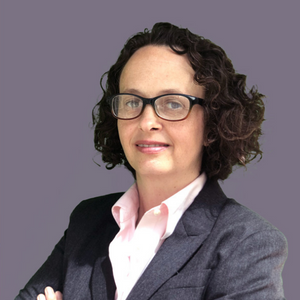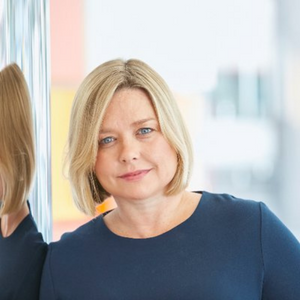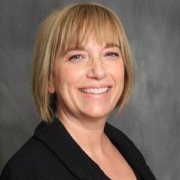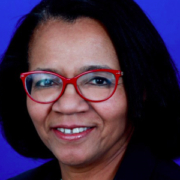Erica Klinkowize: CBNA Treasurer, Citi
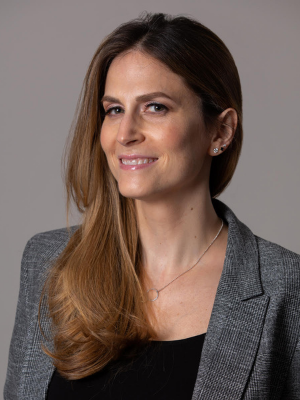 “It can be intimidating in finance when you’re fresh out of college, but I would encourage anyone to not discount their own opinions or gut instincts,” says Erica Klinkowize. “It’s important to differentiate early on between this is who I am and this is who my company is.”
“It can be intimidating in finance when you’re fresh out of college, but I would encourage anyone to not discount their own opinions or gut instincts,” says Erica Klinkowize. “It’s important to differentiate early on between this is who I am and this is who my company is.”
Klinkowize speaks to developing gut instincts, the shorter- and longer-term journeys of networking, and intensive listening.
Hone Your Personal Gut Instinct
After working a short while at Prudential Securities, then at Goldman Sachs for over a decade, moving to Bank of America for seven years, and then to Citi last summer, Klinkowize observed that she, early in her career, internalized a gut instinct that was highly influenced by organizational viewpoints.
She found herself consistently asking what would the company do? While a valuable perspective, she realized it was important to differentiate her own gut instincts as she grew as a leader, so as to discern different perspectives, including what was her own intuition.
“Something would pop up, for example, in a meeting or conversation, and I’d have a negative feeling,” says Klinkowize. “I’d often quash it or question it until I came to a rationalized conclusion or the whole thing dissolved, which is not the same as listening to your gut instinct.”
She intentionally learned, with the help of executive coaching, to develop her gut instincts, recognizing that her emotional responses are often held in her upper stomach where her ribs meet, around her solar plexus: “You should know where your emotions strike you.”
Learning to discern, trust, and develop her gut instincts has been a core component of her leadership journey: “First, you need to be able to identify it: I’m having a feeling. Then you need to name the feeling and ask yourself: What is driving that feeling and is it worthy of speaking up for? Then you ultimately need the self-confidence to speak up, be potentially willing to engage in a disagreement, and simply not question it too much. The more you question it, the more likely you are to miss the appropriate moment to say something, or to lose the feeling entirely. As you move through life, your gut instinct is one thing that stays with you, no matter what you choose.”
Enrich Your Leadership With Exposure
Her background is largely in Treasury, but Klinkowize spent over two years partnering to head up a trading desk for Global Markets at Bank of America before joining Citi and returning to Treasury.
“It’s like riding a bike coming back to Treasury, in that things don’t change that quickly, but I found that I was different,” she observes. “Every experience changes you. Every risk you take, every career move you make, each one enhances your perspective on things, provides you with moments to improve your ability to hone your gut instincts, and increases your understanding of human beings. How you respond in situations changes, and you learn to do things better for everyone around you.”
Klinkowize attributes her recent move to Citi once again to instinct. She loved her team and trading desk journey at Bank of America and the rich connections she made. But when an unexpected opportunity came, along with an interview journey full of sparks and connections, she heeded the call on what was right for her development.
Along with diversifying experiences, she takes inspiration from other leaders and mentors to catalyze her growth.
“I spend time observing the people who I feel are ‘ahead of me’ in a way that I feel matters, and I ask myself what are they really good at – I watch people in meetings, noticing mannerisms, how they sit, how they dress, the speed and cadence of speech, the way they organize a deck or argument. I also note what characteristics I would not want to adopt,” she reflects. “That practice has helped me bring out a wider breadth of traits and abilities within myself.”
Klinkowize feels a big part of her own value as a mentor is her willingness to share openly all kinds of experiences including the most challenging moments of her career, such as going through pregnancy with an unsupportive manager at a previous employer. She sees mentorships as mutually beneficial and useful for reflecting on her own growth.
“Everyone looks at people who they consider successful and thinks it was a straight shot up,” she notes. “But it’s been a very up and down experience. I’ve constantly tried to remind myself that perception is reality and ask myself what am I doing (or accepting) that I need to change, which comes back to gut instinct.”
Network Early and Broadly
While at Columbia working on her MBA, Klinkowize was given the challenge to draw her network, which turned out to be very closed relative to her fellow professional classmates.
“It didn’t really register with me until I got to business school that I needed to network beyond my group and then beyond my organization,” she admits.
A latecomer to networking, initially more comfortable with keeping her head down and doing the work, Klinkowize is now its biggest advocate. She emphasizes the importance of networking early on and broadly – beyond formal programs, beyond your company, beyond your direct area of work.
“When I look back, I saw my (performance) equivalents at Goldman getting promoted faster than I was and only later did I realize that I had done a bad job at networking,” she realizes. “I had done a bad job at those things that felt hard and that I didn’t want to do.”
Klinkowize notes that while she was well-liked, she hadn’t cultivated the professional connections who would be pounding on the table for her at promotion time. Later, she gained that level of sponsorship and really felt the difference in support and validation of having someone put their name and reputation on the line for her.
Getting over her resistance to networking required having patience with the journey: “There’s a short-term experience and a longer-term experience to doing what is hard to do (for you),” notes Klinkowize.
“I’d walk away from a networking session exhausted and needing to recuperate, yet I would have learned new things and heard relatable experiences,” she reflects. “Then, it’s like a butterfly effect. You don’t exactly know how, but every interaction you have with someone makes you feel a certain way and changes your trajectory. It can be five minutes that simply reminds you of something that you forgot about yourself, and it’s revolutionary. Or it’s the fact that you’re now top of mind with that person when the next unexpected opportunity comes up.”
“On the other side of doing the hard thing (networking), you see both how your trajectory changes,” says Klinkowize, “and how it becomes more natural to you.”
Model Presence and Perspective
Klinkowize emphasizes the importance of intensive listening: “It’s about deep breathing, calming yourself, listening and not getting caught up in the chaos or the transactional nature of things but instead sitting back and observing the whole thing.”
She feels team members look to leaders for broadness and expansiveness, and embodying yourself in a meeting as a leader sets a tone for the team in terms of moderating stress.
Klinkowize feels intensive listening also helps her hear people on many levels beyond their words, and she tries to “hear with her gut” – for example, catching that moment when someone on the team suggests an idea and she knows intuitively, that’s it.
Despite days of back-to-back meetings, Klinkowize has stopped multitasking 75% of the time, noting that while her days may take a little longer, her stress levels have plummeted.
When with her daughter, her practice is to be fully present and immersed. She has come to appreciate, and actively chooses to spend, more time outdoors, along with their dog, Ash.
By Aimee Hansen


